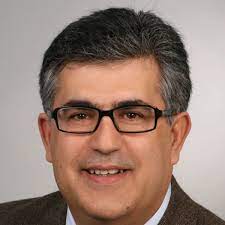Welcome Message
It is with great pleasure that we welcome you to the 36th Experts Meet on Cancer Research & Therapy scheduled for September 28–29, 2026, in the magnificent city of Paris, France. This distinguished event brings together world-renowned oncologists, researchers, healthcare professionals, academicians, and industry leaders to share knowledge, exchange ideas, and explore the latest advancements shaping the future of cancer care.
Cancer Therapy Meeting 2026 serves as a premier platform for global collaboration and scientific innovation. The conference will feature keynote addresses, plenary sessions, and interactive discussions that bridge the gap between laboratory discoveries and clinical applications. Attendees will gain insights into cutting-edge developments across oncology disciplines from precision medicine and immunotherapy to early detection and personalized treatment strategies.
We invite you to be part of this inspiring gathering that celebrates excellence, encourages collaboration, and envisions a future free from cancer. Join us in Paris, where innovation meets compassion and every discussion moves us a step closer to transforming lives through advanced cancer research and therapy
About Conference
The 36th Experts Meet on Cancer Research & Therapy is a premier global gathering that brings together leading oncologists, researchers, clinicians, and industry innovators to explore the latest frontiers in cancer science. Set against the inspiring backdrop of Paris, France, this distinguished event serves as a hub for exchanging visionary ideas and translating pioneering research into impactful clinical applications.
Over two dynamic days, Cancer Therapy Meeting 2026 will feature keynote addresses, scientific sessions, interactive discussions, and networking opportunities designed to bridge the gap between laboratory discovery and patient-focused care. From precision oncology and immunotherapy to advanced diagnostics and emerging therapeutics, the conference offers an all-encompassing platform to redefine the landscape of cancer research and treatment.
Join us as we advance innovation, foster collaboration, and shape the future of global oncology at this landmark event.
Conference Highlights
The conference will feature a range of keynote speeches, panel discussions, and interactive sessions led by some of the leading experts in the field of oncology. Topics will include:
-
Latest advances in cancer research
-
Emerging therapies
-
Clinical trials
-
Cancer prevention and screening
-
Patient care and support
Networking Opportunities
Attendees will have the opportunity to network with fellow professionals and learn about the latest technologies and innovations in cancer diagnosis and treatment. The conference will also provide a poster session where researchers can present their latest findings and engage in discussions with attendees.
Who Should Attend
36th Experts Meet on Cancer Research & Therapy will be useful to participants from both the industry and academia working in all domains of healthcare sectors. Target audience includes:
-
Researchers
-
Scientists
-
Healthcare experts
-
Epidemiologists
-
Physicians
-
Nurse practitioners
-
Healthcare analysts
-
Business delegates
-
Young researchers
-
Advertising and promotion agency executives
-
Professionals in the media sector
-
Professors
-
Surgeons
-
Fellowship holders
-
Surgical technicians
-
Anesthesiologists
-
Medical students
-
Healthcare and pharmaceutical companies
Why Should Attend
The Cancer Therapy Meeting 2026 offers an unparalleled platform to engage with global leaders, share groundbreaking research, and explore innovative solutions in cancer care. With cancer becoming an increasingly complex global health challenge, this conference is designed to address the critical need for novel treatments, advanced diagnostic technologies, and effective prevention strategies.
Attendees will experience an immersive program featuring keynote sessions, plenary discussions, and interactive workshops that cover the latest advancements in therapeutic approaches, precision oncology, and artificial intelligence in cancer care. The event also emphasizes collaboration and networking, providing participants with valuable opportunities to connect with peers, share insights, and establish partnerships.
This conference goes beyond knowledge-sharing by offering a platform to explore pioneering advancements in genomics, personalized medicine, and integrative oncology. Whether you're a researcher, clinician, healthcare professional, or industry expert, the Cancer Therapy Meeting is your gateway to staying updated on the latest trends and contributing to meaningful progress in cancer research and therapy.
Sessions and Tracks
1. Advances in Immuno-Oncology
Explore cutting-edge research and treatments in immunotherapy, focusing on the latest developments in immune checkpoint inhibitors, CAR-T therapy, and cancer vaccines. This track will discuss their impact on personalized cancer care and strategies for overcoming resistance mechanisms.
2. Targeted Therapy and Precision Medicine
Delve into the latest breakthroughs in targeted cancer therapies and how precision medicine is transforming treatment strategies. Topics include genetic profiling, biomarker discovery, and how these innovations are improving treatment outcomes for specific cancer types.
3. Cancer Stem Cells: Understanding and Targeting
This session will examine the role of cancer stem cells in tumor progression and resistance to therapies. Experts will discuss new approaches in targeting these elusive cells, including novel drug delivery systems and immunotherapeutic strategies.
4. Cancer Metabolism and Therapeutic Interventions
Investigate how metabolic reprogramming contributes to cancer progression and drug resistance. This track will explore emerging therapeutic strategies targeting the metabolic pathways of tumors and their potential in clinical applications.
5. Radiation Oncology: Innovations and Techniques
Explore the latest advancements in radiation therapy, including precision radiation techniques, immunoradiotherapy, and the integration of AI in radiotherapy planning and delivery. This session will cover emerging technologies and their clinical implications.
6. Cancer Epidemiology and Prevention
Discuss the latest findings in cancer prevention, screening, and epidemiology, focusing on risk factors, genetic predisposition, environmental influences, and public health strategies to reduce cancer incidence globally.
7. Pediatric Cancer Research and Therapeutics
Highlight the unique challenges in pediatric cancer research, from early detection to novel treatments. This session will address current clinical trials, emerging therapies, and the importance of multidisciplinary care for children with cancer.
8. Artificial Intelligence and Big Data in Cancer Research
Focus on how AI and machine learning are revolutionizing cancer research, from drug discovery to patient diagnostics. Discussions will cover the use of big data for personalized treatment plans, early detection, and predictive models for cancer progression.
9. Clinical Trials and New Drug Development
Examine the process of designing and conducting clinical trials in cancer research, with a particular focus on new drug candidates and biologics. This session will explore regulatory challenges, trial design improvements, and patient recruitment strategies.
10. Oncology Nursing: Advancements in Patient Care
This session will cover the evolving role of oncology nurses in cancer treatment and patient care, focusing on new nursing practices, patient education, and the integration of supportive care strategies in cancer management.
11. Cancer Immunology
Gynecologic cancer immunology delves into the intricate dance between the immune system and cancers such as cervical, ovarian, and endometrial. By unraveling these complex interactions, researchers aim to craft innovative immunotherapies that bolster the body's innate ability to seek out and destroy cancer cells, offering a cutting-edge approach to treatment.
12. Cancer Vaccines
Cancer vaccines are designed to activate the immune system to recognize and combat cancer cells. Preventive vaccines, such as the HPV vaccine, protect against virus-induced cancers, while therapeutic vaccines stimulate an immune response against existing tumors. These innovative approaches aim to reduce cancer incidence and improve treatment outcomes by leveraging the body's natural defense mechanisms.
13. Drug Resistance and Overcoming Challenges
Drug resistance in cancer occurs when cancer cells adapt to evade the effects of treatment, complicating therapy. Overcoming this challenge involves strategies like combination therapies, which use multiple drugs to target different pathways, and personalized medicine, which tailors treatments based on the genetic makeup of the tumor, aiming to outmaneuver resistance mechanisms and improve patient outcomes.
14. Ethical and Regulatory Issues in Cancer Research
Ethical and regulatory issues in cancer research focus on securing informed patient consent, protecting data confidentiality, and ensuring fair access to experimental treatments. Adhering to these principles is vital for ethical integrity, maintaining trust, and facilitating the responsible development of new cancer therapies.
15. Cancer Genomics & Metabolomics
Cancer genomics and metabolomics analyze genetic mutations and metabolic changes in tumors to guide personalized treatment. By mapping these alterations, researchers can develop targeted therapies and refine treatment strategies to more effectively combat cancer based on its unique molecular profile.
16. Innovations in Cancer Data and Informatics
Innovations in cancer data and informatics leverage advanced technologies, such as artificial intelligence and big data analytics, to improve cancer research and therapy. These tools enhance data integration, uncover patterns, and drive personalized treatment strategies, optimizing outcomes through more precise and informed decision-making.
17. Cell-Based Therapy
Cell-based therapy involves using modified or engineered cells, such as CAR-T cells, to target and kill cancer cells with high specificity. By reprogramming immune cells or introducing new cell types, this innovative approach aims to enhance the body’s natural ability to fight cancer, leading to more effective and personalized treatment options.
18. Advancement in the Field of Cancer
Advancements in cancer research and therapy include breakthroughs in targeted treatments, immunotherapy, and precision medicine, which personalize care based on genetic and molecular profiles. These innovations are improving early detection, treatment efficacy, and patient outcomes by addressing the complexities of cancer more effectively.
19. Advances in Supportive Care and Symptom Management
Advances in supportive care and symptom management focus on improving the quality of life for cancer patients through innovative approaches like targeted pain relief, nutritional support, and psychological care. These advancements aim to alleviate treatment side effects, manage symptoms effectively, and provide holistic support throughout the cancer journey.
20. Role of Microbiome in Cancer
The microbiome's role in cancer research explores how gut and body bacteria influence tumor development, treatment response, and immune system interactions. Understanding these microbial impacts can lead to new therapeutic strategies and enhance the effectiveness of existing cancer treatments.
Participation/ presentation options
Oral presentation: Oral Presentations may include the topics from researches, theoretical, professional or private practices in a concise manner. Individuals with personal experience are also welcome to present personal experiences or narratives which help others in everyday life. Speakers with a 30-minute slot should plan to speak for 20-25 minutes, and Keynote speakers should plan to speak for 40-45 minutes, with the remaining time to be used for questions and discussion by the Session Chair.
Workshop: For workshop presenters also, the topic of the talk will be the same as an Oral presentation with more specialized techniques and detailed demonstration. The generalized time duration for a workshop presentation is about 45-50 minutes. Interested participants can join with their respective team and present the workshop with their research coordinators with special group waivers on registration.
Poster presentation: Student Poster Competition will be organized at the Cancer Research and Therapy 2025 conference is to encourage students and recent graduates to present their original research. Presenters will be given about 5-7 minutes to present the poster including questions and answers. Judges may ask questions during the evaluation of the presentation. This is an opportunity for young scientists to learn about the recent findings of their peers to increase their capacity as multidisciplinary researchers. Poster displays will be in hard copy format of 1x1 M long.
For more details regarding Poster Presentation and Judging Criteria view Poster presentation guidelines.
Webinar: The webinar presentation is designed for those interested attendees who cannot join in person due to schedule conflicts or other obligations. In this option, the presenter may record the presentation and their presentation will be presented in the Webinar presentation session.
E-Poster: e-Poster is also similar to the webinar presentation. In this session, their presentation will be published in the form of a poster in the conference website and the presenter abstract will be published in the conference souvenir and journal with DOI.
Exhibition: Cancer Therapy Meeting Conference 2025 has the opportunity to exhibit the products and services from commercial and non-commercial organizations like Drug manufacturers, Clinical Trial Sites, Management Consultants, Chemists, Pharmacists, Business delegates and Equipment Manufacturers.
To know more about exhibitor booth details and benefits visit WHY TO EXHIBIT WITH US?
Send your queries to cancertherapy@europeconferences.com
Advertisement: The conference program is a valuable resource that all attendees refer again and again as they navigate the conference. Advertising in the conference program is a great way to market and can help you secure long term business.
Send your proposal to cancertherapy@europeconferences.com to know the available advertisement options and prices
Sponsor Cancer Therapy Meeting 2025
Premium Sponsorship package
Additional Sponsorship package
Mail the program manager at cancertherapy@europeconferences.com or WhatsApp on (+44 2045861247) to know more about the sponsorship packages.
Market Analysis
The 36th Experts Meet on Cancer Research & Therapy arrives at a defining moment for the global oncology market, which continues to expand rapidly with rising cancer prevalence, increasing investment in precision medicine, and groundbreaking advancements in immunotherapy, targeted treatments, and genomic-driven diagnostics. As the cancer therapeutics market grows beyond USD 196 billion, this conference will play a critical role in showcasing cutting-edge innovations, addressing challenges in accessibility and affordability, and highlighting next-generation solutions that are reshaping early detection, treatment, and survivorship. By convening leading oncologists, researchers, and industry pioneers, the event will strengthen global collaborations, stimulate strategic investments, and influence emerging market trends, ultimately accelerating the development of more effective therapies and improving patient outcomes worldwide.








